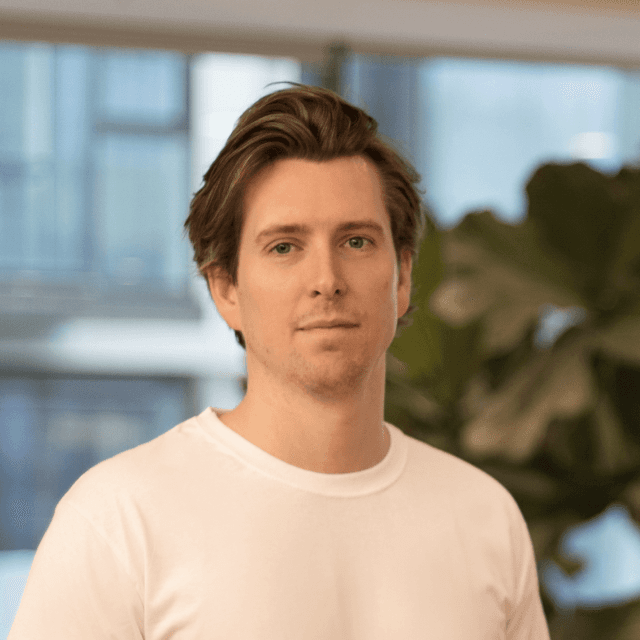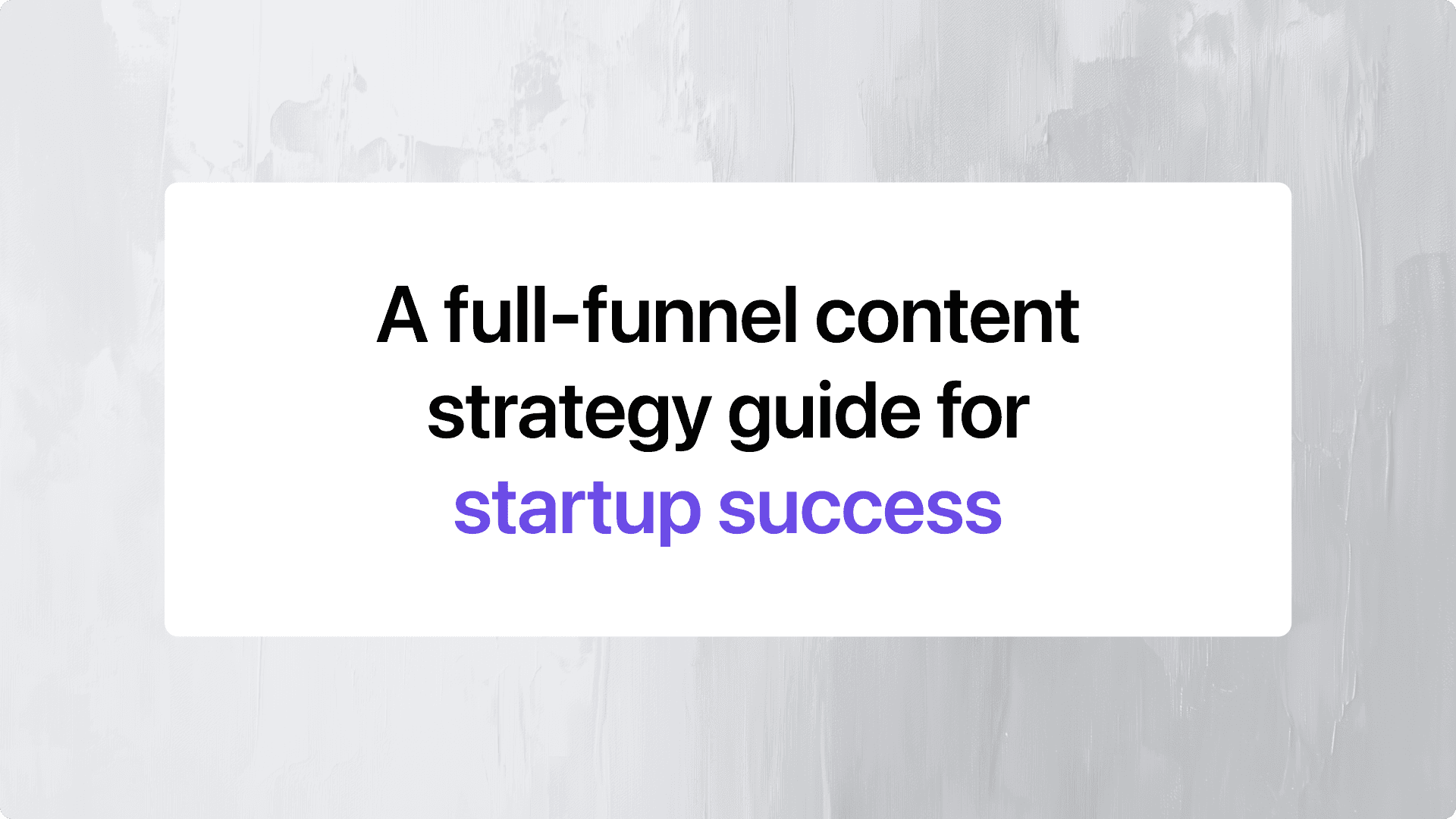Thursday 31 August 2023
·

Ben Hacking
Co-founder & CEO
Image credit:
Arcane
tl;dr
About Cory & Synthesia
Ben: Hi Cory – thanks for taking the time to speak to us. Can you start by giving us an overview of your experience and your role at Synthesia?
Cory: Sure – I’ve been in marketing-specific roles for about four or five years now and have spent most of that time in Growth Marketing roles around the startup world. In that time, I’ve worked for a range of companies, including BibliU, Twenty7Tec and Academy - before I ended up at Synthesia, where I’ve been a Growth Marketing Manager for about a year now.
Synthesia is probably the most advanced startup I’ve worked at in terms of both funding and product development. And honestly it has been a bit of a wild ride. The company has largely grown out of its own steam and we’ve seen over 450% user growth year-on-year, much of that off the back of the AI boom that ChatGPT started. That’s a pretty unique experience for a marketer because you’re not trying to get blood out of a stone, which certainly isn’t the case for every role I’ve worked before.
Ben: And what does marketing look like at Synthesia? How have things changed in the team since you experienced this massive wave of growth?
Cory: The most obvious change is that the company has doubled in size over the last year, and there are now 200 of us. On the marketing team, we’ve gone from eight to over twenty. It has been really interesting to see things develop in that time.
In terms of actual marketing activities, I’m mostly focused on customer retention at the moment. We’ve had a massive wave of new users in the last year and we want to keep as much of that customer base as we can. The biggest tool I’m using for that is email, which I still think is an incredibly powerful way of nurturing new customers and leads. We’re also using in-app notifications as much as possible to drive engagement and keep users excited.
AI x Marketing
My first thought when ChatGPT appeared was, ok – that’s it, my job’s gonna get automated. But clearly that hasn’t happened.
Ben: We can all see that Synthesia has been a big part of the AI boom over the last year - it must have been a really unique experience to work in that environment. I’d be keen to hear your perspective on where the industry is today and the role that AI is playing for marketers.
Cory: It’s been a really interesting year, definitely. Like a lot of marketers, my first thought when ChatGPT appeared was, ok – that’s it, my job’s gonna get automated. But clearly that hasn’t happened and at this moment I don’t really think it’s going to either.
The most notable thing for me as a marketer is realising that probably 90% of what I do is just basically admin. I honestly spend way too much time figuring out why a workflow is broken or answering comments on YouTube. And AI has a really huge role to play here. This work isn’t even close to a fundamental part of my job and yet it still takes hours.
Just one example, I’ve been using AI to automate closed captions for YouTube videos - the automatic ones can be terrible and it’s not great for accessibility. Before, I was spending hours manually putting in capital letters and full stops, thinking “this isn’t real work - what am I doing?”
So, I started using AI to automate that. Sure, it doesn’t work 100% of the time – but ultimately, it doesn’t need to. If it takes a quarter of the time for me to check over and finish it off after the AI’s taken a first stab, then it’s still a win, isn’t it? I think that’s really where the sweet spot for AI sits at the moment.
At the same time, we’re seeing people experiment with generative AI for things like content creation. Clearly, it has a lot to offer here - but there are also limitations. Let’s be frank, AI simply can’t do everything as well as a human can at this stage – and that’s fine. It doesn’t need to be at that level to be useful. But it can be pretty helpful for generating ideas, writing synopses and summarising interviews. That’s why I don’t think AI is going to take many marketing jobs at the moment because it’s this role as an enabler where it really shines.
Looking ahead, I think the biggest opportunities are going to be for small teams and startups. AI lets them do so much more with less – it will really help them compete with the bigger firms who just have more to invest.
Ben: And how do you see this developing in future? Where do you see the biggest opportunities for marketers when it comes to AI?
Cory: I think ultimately we’re not going to see a lot of marketing roles being lost, but we’ll see marketers doing a lot more within their existing roles – or pivoting to something slightly different. I think income generated and productivity per head will go up. And, ultimately, we’re going to spend less time on tedious admin – which is something we can all get behind.
Looking ahead, I think the biggest opportunities are going to be for small teams and startups. AI lets them do so much more with less – it will really help them compete with the bigger firms who just have more to invest. If I think back to the last company I worked at, we didn’t have much marketing budget at all. So, I used an AI tool called Jasper to generate content ideas – and that was really helpful. So much of it just comes down to time and resources and I think AI is a great leveler in that sense.
Marketing at Synthesia
Ben: I definitely agree with that. One thing that I’ve really noticed working in the startup world is how valuable experimentation is. How do you approach experimentation as a growth team at Synthesia? And how do you balance that with the need to have a consistent, professional brand as you grow?
Cory: As a startup, you absolutely have to learn how to try things and see what happens. One of the great things about Synthesia is that we’re always happy to give something a go.
I like to think about my tasks as a combination of Type A and Type B decisions. Type A decisions can change the direction of the company and should be strongly thought through, critiqued and tested. Type B decisions have a fairly small impact and don’t really negatively affect the business or its reputation.
Ultimately, most things we do are Type B decisions. It’s better to make a mistake and learn from it than to never try anything. If we’re working on an email then absolutely we’ll try something new, give it a proof and send it out. If it doesn’t work, it’s no big deal – we’ll just learn something new next time. That’s how you adapt and improve.
Ben: That absolutely resonates with me and it’s really interesting to hear your thoughts on that. Looking overall at the last year, what would you say has been the most surprising part of working at Synthesia?
Cory: It has to be the massive growth we’ve had since December last year. We can't really take the credit for all of this — we were growing hugely before, but a great deal of the growth we've seen since December came out of the buzz that ChatGPT created. In many ways, we had the right product for that moment.
The organic growth has been wild and just really not something you see in other companies. Now, it’s down to us to retain as much of this interest as we possibly can.
Ben: It’s interesting to hear you say how much focus there is on retention. Most marketers would do things the other way around and retention can often be an afterthought. How do you approach this?
Cory: It’s really a unique situation to be in as a marketer. Since we had this insane growth, customer retention is now an important problem to solve – because we know that, ultimately, the wave isn’t going to last forever. Not every customer who joins the bandwagon is going to stay on it and things will eventually settle. That’s fine and totally normal – it’s just part of being the new thing. But our attitude is let’s keep the customers around where we can.
The solution is to try and stick to what we do well. There’s going to be customer churn, of course there is. But we’re focusing on customers where we know we can keep delivering value – and a lot of the time that’s around learning and development (L&D).
We’re finding customers get a lot of value out of the platform when they’re creating training videos for, say, health and safety or compliance or onboarding videos. With an AI video editing platform, you can play around with things like the aspect ratio, or change the language so you can create the same video in Spanish, German or whatever it is you need. That’s a huge value-add compared with re-dubbing everything in new languages. So our goal now is to target the customers we know will see long-term value with the product.
For aspiring Marketers
The key skill people need now is adaptability. Things like having good communication skills and a willingness to learn make a huge difference.
Ben: That makes a lot of sense and will have a tangible impact on business outcomes as well. Thanks a lot for your insights! To round off our conversation, I’d love to hear any advice you have for young people starting out in the world of growth marketing today.
Cory: Things have definitely changed in the last decade. Going into growth marketing ten years ago, there was a lot of emphasis on being able to code, but I don’t think that’s as true anymore. Sure, it helps if you can do an SQL query or you can access an API. But in general, these things are becoming less important - and arguably, it’s the softer skills that are becoming more important.
The key difference now is you need to be adaptable. Things like having good communication skills and a willingness to learn make a huge difference.
You should also be aware that, ultimately, this is a changing market and you’re not going to have a job for life. So you should be willing to learn new skills and be open to the possibility that you might not be doing the same job in five or ten years. This sense of rapid change will only increase with AI, so I think succeeding in this market is going to require a totally different mindset. People need to be willing to pick up new skills and try new things.
Ben: I certainly agree, and I think that’s one of the most important takeaways of this chat. Well, I think that rounds off our chat pretty nicely – and it has been really insightful to hear your thoughts. Thanks a lot for your time, Cory.







